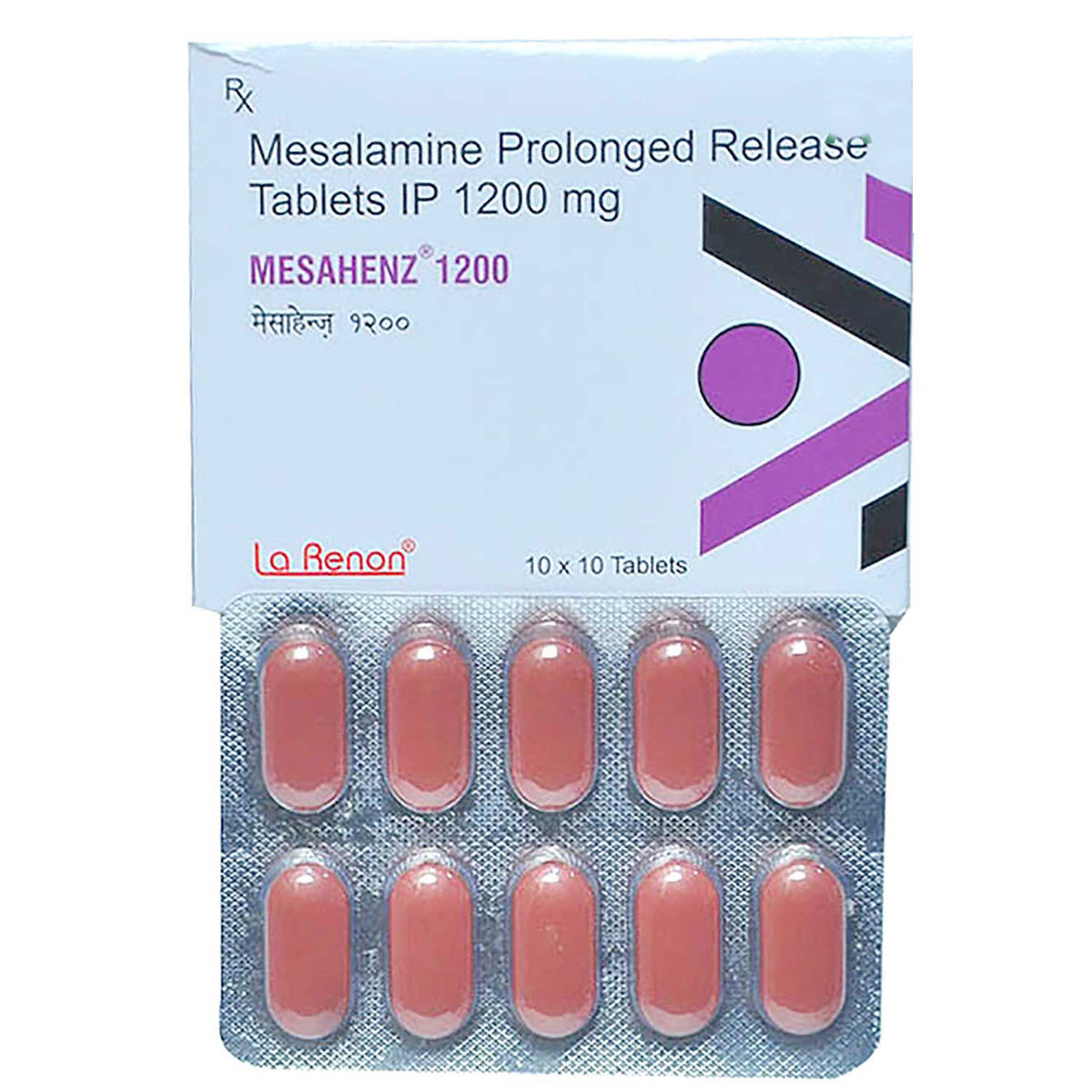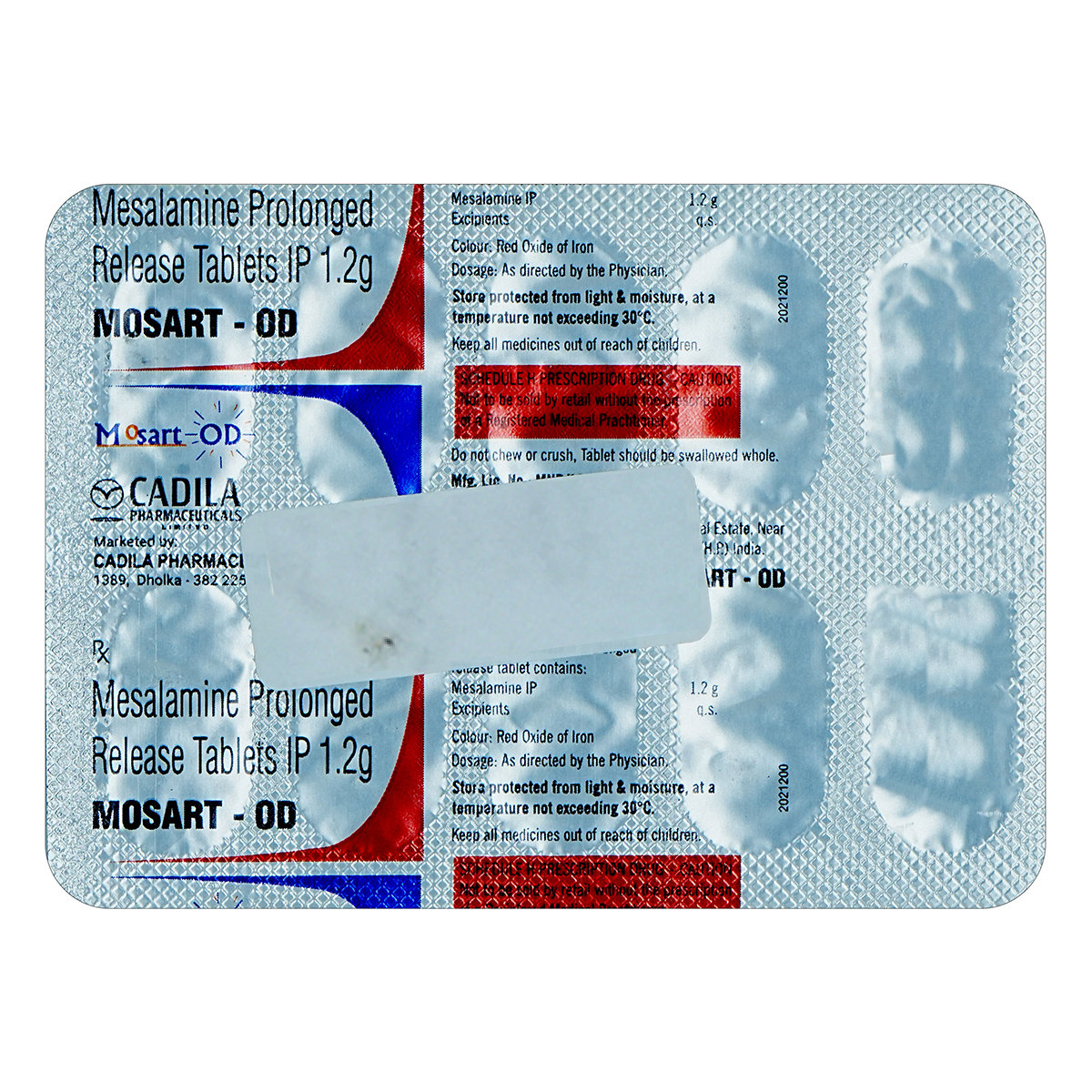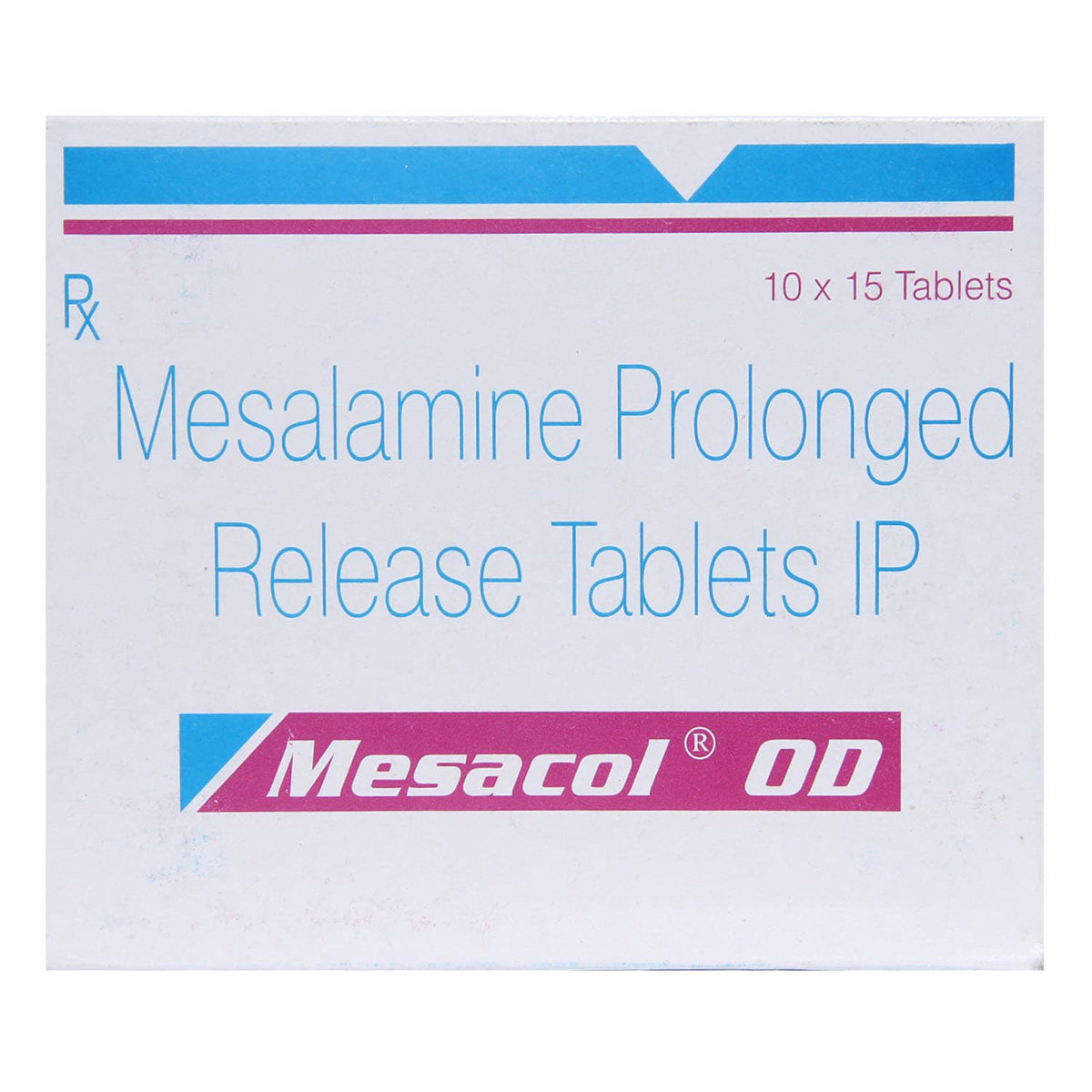Bravasa 1.2 gm Tablet 10's
MRP ₹247
(Inclusive of all Taxes)
₹37.0 Cashback (15%)
Provide Delivery Location
Online payment accepted
 Prescription drug
Prescription drugWhats That
Composition :
Manufacturer/Marketer :
Consume Type :
Expires on or after :
Return Policy :
About Bravasa 1.2Gm Tab
Bravasa 1.2Gm Tab belongs to a class of drugs called 'anti-inflammatory drugs used to treat ulcerative colitis and Crohn’s disease. Ulcerative colitis is a type of chronic inflammatory bowel disease that causes inflammation of the large intestine lining (colon). It produces ulcers on the colon's lining, which may cause bleeding and discharge of pus and mucus.
Bravasa 1.2Gm Tab contains Mesalamine, which works by inhibiting the production of certain chemical substances, such as prostaglandins, that cause pain and swelling. Thereby, it reduces inflammation (swelling) in the intestines and provides relief from symptoms such as stomach pain or bleeding.
Take Bravasa 1.2Gm Tab as prescribed. You are advised to use Bravasa 1.2Gm Tab for as long as your doctor has recommended it for you based on your medical condition. In some cases, you may experience diarrhoea, stomach pain, headache, nausea, vomiting or flatulence (gas). Most of these side effects of Bravasa 1.2Gm Tab do not require medical attention and gradually resolve over time. However, if the side effects persist or worsen, please consult your doctor.
Inform your doctor if you are allergic to any components present in Bravasa 1.2Gm Tab . Bravasa 1.2Gm Tab should be used with caution in the elderly. If you are pregnant or breastfeeding, please inform your doctor before taking Bravasa 1.2Gm Tab . Mesalamine tablet is not recommended for children below two years, and granules are not recommended for children below six years. However, Bravasa 1.2Gm Tab should be given to children only if advised by a doctor. Avoid taking Bravasa 1.2Gm Tab if you have severe kidney failure. If you have stomach pain, cramps, severe headache, fever or rash, stop taking Bravasa 1.2Gm Tab immediately and consult a doctor.
Uses of Bravasa 1.2Gm Tab
Directions for Use
Key Benefits
Bravasa 1.2Gm Tab contains Mesalamine, an anti-inflammatory drug used to treat ulcerative colitis and Crohn’s disease. It works by inhibiting the production of certain chemical substances, such as prostaglandins, that cause pain and swelling. Thereby helping reduce inflammation (redness and swelling) in the intestines and providing relief from symptoms such as stomach pain or bleeding. Also, Bravasa 1.2Gm Tab may prevent further episodes of ulcerative colitis.
Storage
- Hydrate your body: Drink enough water to prevent dehydration and headaches.
- Calm Your Mind: Deep breathing and meditation can help you relax and relieve stress.
- Rest and Recharge: Sleep for 7-8 hours to reduce headache triggers.
- Take rest: lie down in a quiet, dark environment.
- Cold or warm compresses can help reduce tension.
- Stay Upright: Maintain good posture to keep symptoms from getting worse.
- To treat headaches naturally, try acupuncture or massage therapy.
- Over-the-counter pain relievers include acetaminophen and ibuprofen.
- Prescription Assistance: Speak with your doctor about more substantial drug alternatives.
- Severe Headaches: Seek emergency medical assistance for sudden, severe headaches.
- Frequent Headaches: If you get reoccurring headaches, consult your doctor.
- Headaches with Symptoms: Seek medical attention if your headaches include fever, disorientation, or weakness.
- Inform your doctor about the nausea and discuss possible alternatives to the medication or adjustments to the dosage.
- Divide your daily food intake into smaller, more frequent meals to reduce nausea.
- Opt for bland, easily digestible foods like crackers, toast, plain rice, bananas, and applesauce.
- Avoid certain foods that can trigger nausea, such as fatty, greasy, spicy, and smelly foods.
- Drink plenty of fluids, such as water, clear broth, or electrolyte-rich beverages like coconut water or sports drinks.
- Use ginger (tea, ale, or candies) to help relieve nausea.
- Get adequate rest and also avoid strenuous activities that can worsen nausea.
- Talk to your doctor about taking anti-nausea medication if your nausea is severe.
- Record when your nausea occurs, what triggers it, and what provides relief to help you identify patterns and manage your symptoms more effectively.
- Inform your doctor about dizziness symptoms. They may adjust your medication regimen or prescribe additional medications to manage symptoms.
- Follow your doctor's instructions for taking medication, and take it at the same time every day to minimize dizziness.
- When standing up, do so slowly and carefully to avoid sudden dizziness.
- Avoid making sudden movements, such as turning or bending quickly, which can exacerbate dizziness.
- Drink plenty of water throughout the day to stay hydrated and help alleviate dizziness symptoms.
- If you're feeling dizzy, sit or lie down and rest until the dizziness passes.
- Track when dizziness occurs and any factors that may trigger it, and share this information with your doctor to help manage symptoms.
- Chest pain may last for a while and needs immediate medical attention as it is a significant health issue to be attended to.
- Take rest and refrain from doing physical activity for a while, and restart after a few days.
- Try applying an ice pack to the strained area for at least 20 minutes thrice a day. Ice pack thus helps reduce inflammation.
- Sit upright and maintain proper posture if there is persistent chest pain. • Use extra pillows to elevate your position and prop your chest up while sleeping.
- Rest well; get enough sleep.
- Eat a balanced diet and drink enough water.
- Manage stress with yoga and meditation.
- Limit alcohol and caffeine.
- Physical activities like walking or jogging might help boost energy and make you feel less tired.
- Inform Your Doctor: Notify your doctor immediately about your diarrhoea symptoms. This allows them to adjust your medication or provide guidance on managing side effects.
- Stay Hydrated: Drink plenty of fluids to replace lost water and electrolytes. Choose water, clear broth, and electrolyte-rich drinks. Avoid carbonated or caffeinated beverages to effectively rehydrate your body.
- Follow a Bland Diet: Eat easy-to-digest foods to help firm up your stool and settle your stomach. Try incorporating bananas, rice, applesauce, toast, plain crackers, and boiled vegetables into your diet.
- Avoid Trigger Foods: Steer clear of foods that can worsen diarrhoea, such as spicy, fatty, or greasy foods, high-fibre foods, and dairy products (especially if you're lactose intolerant).
- Practice Good Hygiene: Maintain good hygiene to prevent the spread of infection. To stay healthy, wash your hands frequently, clean and disinfect surfaces regularly, and avoid exchanging personal belongings with others.
- Take Anti-Diarrheal Medications: If your doctor advises, anti-diarrheal medications such as loperamide might help manage diarrhoea symptoms. Always follow your doctor's directions.
- Keep track of your diarrhoea symptoms. If they don't get better or worse or are accompanied by severe stomach pain, blood, or dehydration signs (like extreme thirst or dark urine), seek medical help.
- Inform your doctor about your constipation symptoms. They may adjust your medication or advise alternative treatments.
- Stay hydrated by drinking sufficient of water (at least 8-10 glasses a day) to help soften stool and promote bowel movements.
- Increase fibre intake by eating foods high in fibre, such as fruits, whole grains, vegetables and legumes, to help bulk up the stool.
- Establish a bowel routine by trying to go to the bathroom at the same time each day to train your bowels.
- Engaging in regular exercise, like walking or yoga, can support in bowel movement stimulation.
- Consult your doctor if constipation persists, and discuss alternative treatments or adjustments to your medication.
Drug Warnings
Inform your doctor if you're allergic to any ingredient in the Bravasa 1.2Gm Tab . Bravasa 1.2Gm Tab should be used with caution in the elderly. If you are pregnant or breastfeeding, inform your doctor before taking Bravasa 1.2Gm Tab . Avoid taking Bravasa 1.2Gm Tab if you have severe kidney failure. Severe skin reactions such as toxic epidermal necrolysis (skin peeling and blistering) or Stevens-Johnson syndrome (a painful rash that spreads and blisters) can occur in some patients taking Bravasa 1.2Gm Tab . Therefore, if you notice any skin reactions while taking Bravasa 1.2Gm Tab , please consult a doctor immediately. If you have stomach pain, cramps, severe headache, fever or rash, stop taking Bravasa 1.2Gm Tab immediately and consult a doctor. Avoid taking Bravasa 1.2Gm Tab if you have had blood abnormalities or kidney problems while taking other medicines such as Sulphasalazine.
Drug-Drug Interactions
Drug-Drug Interactions
Login/Sign Up
Co-administration of Bravasa 1.2 gm Tablet with Cidofovir can increase the risk of kidney problems.
How to manage the interaction:
Taking Bravasa 1.2 gm Tablet with Cidofovir is generally avoided as it can possibly result in an interaction, it can be taken if a doctor has advised it. However, if you experience increased or decreased urination, sudden weight gain or loss, shortness of breath, consult a doctor. Do not discontinue any medications without consulting a doctor.
Co-administration of omeprazole with Bravasa 1.2 gm Tablet can decrease the effects of Bravasa 1.2 gm Tablet.
How to manage the interaction:
There could be a possible interaction between Bravasa 1.2 gm Tablet and omeprazole, but they can be taken together if a doctor has prescribed them. Do not discontinue any medications without consulting a doctor.
Co-administration of Tenofovir alafenamide with Bravasa 1.2 gm Tablet may increase the risk of kidney problems.
How to manage the interaction:
There is a possibility of interaction between Bravasa 1.2 gm Tablet with Tenofovir alafenamide, but they can be taken together if a doctor has prescribed them. Consult a doctor immediately if you experience increased or decreased urination, swelling, shortness of breath, bone pain, cramping in the muscles. Do not discontinue the medication without consulting a doctor.
Co-administration of Metrizamide with Bravasa 1.2 gm Tablet may increase the risk of kidney problems.
How to manage the interaction:
Although, there is a possibility of interaction between Bravasa 1.2 gm Tablet with Metrizamide they can be taken together if a doctor has prescribed them. Consult a doctor immediately if you experience any symptoms such as swelling in feet and ankles, dry, itchy skin, urinating either too much or too little. Do not discontinue any medication without consulting a doctor.
Co-administration of Nizatidine with Bravasa 1.2 gm Tablet can decrease the level or effect of Mesalamine by increasing gastric pH.
How to manage the interaction:
Although there may be a possible interaction between Bravasa 1.2 gm Tablet with Nizatidine, they can be taken together if a doctor has prescribed them. Do not discontinue any medications without consulting a doctor.
Co-administration of Iodamide with Bravasa 1.2 gm Tablet may increase the risk of kidney problems.
How to manage the interaction:
Although, there is a possibility of interaction between Mesalamine with Iodamine they can be taken together if a doctor has prescribed them. Consult a doctor immediately if you experience any symptoms such as swelling in feet and ankles, itchy skin, shortness of breath, urinating either too much or too little. Do not discontinue any medication without consulting a doctor.
Co-administration of Ranitidine with Bravasa 1.2 gm Tablet can decrease the levels of Bravasa 1.2 gm Tablet, which may be less effective in treating a condition.
How to manage the interaction:
There may be a possible interaction between Bravasa 1.2 gm Tablet with Ranitidine, but they can be taken together if a doctor has prescribed them. Do not discontinue any medications without consulting a doctor.
Co-administration of Deferasirox with Bravasa 1.2 gm Tablet may increase the risk of kidney problems.
How to manage the interaction:
Although there is a possibility of interaction between Bravasa 1.2 gm Tablet and Deferasirox but they can be taken together if a doctor has prescribed them. Consult a doctor immediately if you experience any symptoms such as increased or decreased urination, abrupt weight gain or loss, weakness, or dizziness. Do not discontinue the medication without consulting a doctor.
Co-administration of Iomeprol with Bravasa 1.2 gm Tablet may increase the risk of kidney problems.
How to manage the interaction:
Although, there is a possibility of interaction between Bravasa 1.2 gm Tablet and Iomeprol they can be taken together if your doctor has prescribed them. Consult a doctor immediately if you experience any symptoms such as swelling in feet and ankles, urinating either too much or too little. Do not discontinue any medication without consulting a doctor.
Drug-Food Interactions
Drug-Food Interactions
Login/Sign Up
Diet & Lifestyle Advise
- Maintain a low-fat diet and eat foods rich in vitamin C, such as bell peppers, spinach, parsley, and berries, to help heal faster.
- Include olive oil and omega-3 fatty acids.
- Eat more fibre-rich foods such as fruits and vegetables.
- Limit dairy intake as your body may develop difficulty digesting certain dairy products when affected with Crohn’s disease, leading to stomach cramps, diarrhoea, or stomach upset.
- Drink plenty of water to prevent dehydration.
Side Effects of Bravasa 1.2Gm Tab
- Diarrhoea
- Stomach pain
- Headache
- Nausea
- Vomiting
- Flatulence (gas)
Habit Forming
Therapeutic Class
All Substitutes & Brand Comparisons
RX
Out of StockMesavin-1200 mg SR Tablet 10's
Alniche Life Sciences Pvt Ltd
₹214
(₹19.26 per unit)
13% CHEAPERRX
Mesahenz 1200 Tablet 10's
La Renon Healthcare Pvt Ltd
₹258.5
(₹23.27 per unit)
4% COSTLIERRX
Out of StockMesatis-OD Tablet 10's
Tesla Labs
₹288
(₹28.8 per unit)
29% COSTLIER
Author Details
We provide you with authentic, trustworthy and relevant information
Drug-Diseases Interactions
Drug-Diseases Interactions
Login/Sign Up
FAQs
Drug-Drug Interactions Checker List
- LACTULOSE
- ASPIRIN
- IBUPROFEN
- AZATHIOPRINE
- THIOGUANINE
- MERCAPTOPURINE
Special Advise
- Blood and urine tests are recommended before and during the treatment with Bravasa 1.2Gm Tab to monitor the functioning of the kidney, liver, and blood.
Disease/Condition Glossary
Ulcerative colitis: Ulcerative colitis is a type of chronic inflammatory bowel disease that causes inflammation of the lining of the large intestine (colon) and produces ulcers on the lining of the colon, which may cause bleeding and discharge of pus and mucus. The common symptoms include bloody stools, stomach pain, rectal pain, diarrhoea, fever, or weight loss. Additionally, it may cause other problems such as joint pain or swelling, mouth sores, skin problems, decreased appetite, or nausea. The factors involved in causing ulcerative colitis include immune disorders, environmental factors like viruses, bacteria, or antigens, which may trigger the immune system, and genes inherited from the parent.
Crohn’s disease: Crohn’s disease is a type of chronic inflammatory bowel disease that can affect any part of the gastrointestinal tract, from mouth to anus. But mostly occurs in the small intestine and large intestine. The symptoms include blood in stools, stomach cramps, tiredness, diarrhoea, fever, weight loss, or loss of appetite.

Have a query?
Alcohol
Safe if prescribed
It is unknown whether it is safe to consume alcohol with Bravasa 1.2Gm Tab . However, as a precautionary measure, it is advisable not to take or limit alcohol.
Pregnancy
Consult your doctor
Bravasa 1.2Gm Tab should not be used in pregnancy unless necessary. So, inform your doctor if you are pregnant or suspect pregnancy. Your doctor will weigh the benefits and potential risks before prescribing this medicine.
Breast Feeding
Consult your doctor
Bravasa 1.2Gm Tab should not be used in nursing mothers unless necessary. So, inform your doctor if you are a nursing mother. Your doctor will weigh the benefits and potential risks before prescribing this medicine.
Driving
Safe if prescribed
Bravasa 1.2Gm Tab usually does not affect your ability to drive or operate machinery.
Liver
Consult your doctor
Limited information is available about using Bravasa 1.2Gm Tab in patients with liver disease. Inform your doctor before taking Bravasa 1.2Gm Tab if you have a history of liver diseases/conditions. Your doctor will prescribe only if the benefits outweigh the risks.
Kidney
Consult your doctor
Inform your doctor before taking Bravasa 1.2Gm Tab if you have a history of kidney diseases/conditions. Bravasa 1.2Gm Tab should be used with extreme caution in patients with mild to moderate kidney impairment. It is recommended not to take Bravasa 1.2Gm Tab if you have severe kidney impairment.
Children
Safe if prescribed
Mesalamine tablet is not recommended for children below two years, and granules are not recommended for children below six years. However, Bravasa 1.2Gm Tab should be given to children only if recommended by a doctor.












